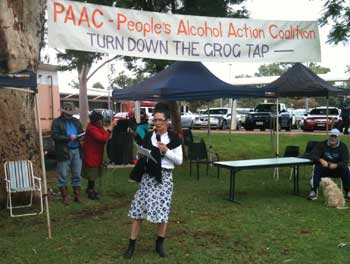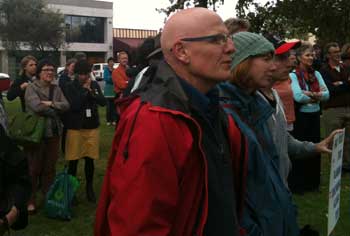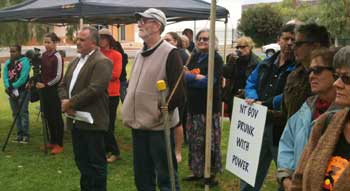NT a 'bully state' with new criminalisation of drunkenness
13 May 2013
 By KIERAN FINNANE
By KIERAN FINNANE
No government politicians came to face their critics at today’s grog issues rally in Alice Springs. Chief Minister Adam Giles, MLAs Robyn Lambley, Alison Anderson and Bess Price (as well as CL Senator Nigel Scullion) were all invited. Most apparently sent their apologies. Government advisor Adrian Renzie was in the crowd.
At right: Donna Ah Chee, Congress CEO, addresses the rally of around 80 people.
The government was accused by Russell Goldflam of bringing in a “bully state”, a “slammer state”. Speaking as President of the Criminal Lawyers Association of the Northern Territory and White Ribbon Ambassador, he said the government was “hell bent on jamming as many of its citizens in the slammer as they can”. And this when the NT already has five times the national imprisonment rate, has doubled its prison population in last 10 years, and will double it again in next five years.
Particularly in his sights were the proposed new “Alcohol Protection Orders” (APOs) that Minister for Business Dave Tollner announced on Friday. In a media release Mr Tollner said the orders will be introduced under the Liquor Act, will support the Government’s target of a 10% reduction in crime and further strengthen the tools available to NT Police in responding to alcohol-related offences, including domestic violence.
According to the release, an APO will prevent a person from possessing or consuming alcohol or attending licensed premises, other than for work or for place of residence.
It can be issued to any person who is charged with an offence carrying a minimum penalty of six months imprisonment or more, where alcohol was a factor (including offences under the Traffic Act). These orders can be issued for three, six or 12 months – three months for the first offence, six months for a second offence and 12 months for a third or subsequent offence.
Mr Goldflam said the orders look like “the old BAT notices”, that were part of the Banned Drinker Register regime – BAT standing for Banning Alcohol and Treatment. The critical difference is that if a BAT Notice was breached – by someone having a drink – the person was ordered into treatment. If an APO is breached, there’s no treatment, the behaviour is criminalised, the person can get charged, and can end up being sent to gaol.
 Mr Tollner was quite up front about this in his release: the BDR was not a law enforcement tool; APOs are “purely a law enforcement tool and will be issued by police with detection and enforcement of breaches through policing activities”.
Mr Tollner was quite up front about this in his release: the BDR was not a law enforcement tool; APOs are “purely a law enforcement tool and will be issued by police with detection and enforcement of breaches through policing activities”.
At left: Longtime grog campaigner Dr John Boffa (in red) at the rally.
Donna Ah Chee, CEO of Central Australian Aboriginal Congress, told the rally that the APOs would be unenforceable without the ID system in place that supported the BDR and, on behalf of Congress, she called for the reinstatement of both. As well as targeting problem drinkers, the ID system had helped prevent underage drinking, she said.
Mr Goldflam also criticised Mr Tollner for his refusal to agree to the appointment of an assessor to look at the so-called “animal bars come drive-in bottleshops”. He cited Mr Tollner’s letter to federal Indigenous Affairs Minister Jenny Macklin, as saying that it would be “inappropriate” to isolate and target these two premises and that there were “no data, facts or evidence” to causally link them to alcohol-related harm.
“What about, Mr Tollner, you start publishing some data, facts, information about the sale of alcohol from these premises which you are responsible for the licensing of. Shame on you for turning a willfully, hypocritically blind eye to those who profit from this toxic trade, and for isolating and targeting its victims,” said Mr Goldflam.
Dr John Boffa, prominent PAAC spokesperson and 2012 NT Australian of the Year, said the Alcohol Protection Orders have been revealed as the major policy of the Country Liberals. Their mandatory rehabilitation program will only deal with 120 people at a time, while the APOs will “pick up thousands”.
Mr Tollner certainly sees the APOs as having a broad catchment. According to his release, “approximately 70 per cent of domestic violence order breaches responded to are alcohol-related. In the 12 months in the lead up to March 31 2013, there were 22,041 alcohol-related incidents across the Territory. In 2011-12, NT Police breath-tested 168,134 drivers – 5.1 per cent were detected for drink driving offences.”
Dr Boffa said there was no mandate for this policy. In the election campaign, Terry Mills, the “soft face” of the Country Liberals, had focussed on treatment for alcohol problems “as if they had a medical condition”, and had said the money would be found to support it.
The $100 million over three years now going into their mandatory rehabilitation program – more of a detention program than a treatment program – would be a massive waste of money, claimed Dr Boffa, and like Ms Ah Chee, he would prefer to see that money put into education, to support the Gonski reforms.
 Deputy Leader of the Opposition Gerry McCarthy suggested that in 2013 adressing alcohol abuse in the NT will cost close to $1b, “one fifth of budget”, up from $700m in 2007.
Deputy Leader of the Opposition Gerry McCarthy suggested that in 2013 adressing alcohol abuse in the NT will cost close to $1b, “one fifth of budget”, up from $700m in 2007.
At right: MLA Gerry McCarthy, holding his speech notes; Adam Findlay, Labor candidate for Araluen at last election, holding banner, reading ‘NT Gov drunk with power’.
He said the “radical measure” of quarantining up to 80% of problem drinkers’ welfare payments was on the cards when his party lost power. Introducing it though, if they return to government, was not mentioned. But he did promise to reintroduce the BDR, alcohol courts, to maintain restrictions on alcohol trading hours, support Local Alcohol Management Plans, fund rehabilitation that works, properly fund sobering up shelters and not “clog up” emergency departments, and “crack down on licensed premises that continue to play with the law”.
Mr McCarthy urged people to continue to stand up and be counted in the fight to save fellow Territorians from “a hell on earth”, and to save children “who aren’t even born yet”.



How will the Alcohol Protection Orders – APOs – work? Why do we say that these will re-criminalise public drunkenness through the ‘back door’ and turn the clock back 30 years?
We haven’t seen the legislation yet and we won’t until June according to Minister Dave Tollner. But this is what we know from his public statements:
Alcohol Protection Orders will issued to people charged (but not yet convicted) of an offence where alcohol is involved and which carries maximum penalty of at least six months in gaol. There are many such offences, including most drink-driving offences, property offences, disorderly behaviour and assaults. APOs will be separately issued – that is, not by the officer who charges the person with the original alleged offence – and they will have to be issued by a Sergeant or someone of higher rank.
If a person breaches their APO, for example, if they drink anywhere (including at home), are drunk in public, enter licensed premises whether or not they drink alcohol there, buys or possesses alcohol, they will be in breach and face penalties of fines or prison sentence for the breach. This is regardless of whether they have at this stage been convicted of the original offence. If police find a person in circumstances that constitute a breach, they will be charged with that breach. It will be a stand-alone offence but APOs themselves will ‘fall away’ if there is a finding of not guilty on the original charge. A charge of breaching an APO would not.
Example:
I am charged whilst drunk with a property offence with a maximum penalty of three years’ imprisonment.
I am bailed on the property charge to appear in court three weeks later and will be saying I am not guilty.
I am also given – separately – an APO because of the alcohol-related property charge.
While on bail for the property charge I have a beer at the pub. A police officer sees me, checks out my details and I am charged with breaching the APO.
I go to the pub again but don’t drink alcohol, but am charged with a second breach for being on licensed premises.
I am found not guilty on the original charge but I still have to deal with two charges of breaching the APOs, one by having a beer and another by just being in a pub.
This is how the NT Government is re-criminalising public drunkenness, or in this case, not even drunkenness but merely having a drink or being on licensed premises – a backward step through the ‘back door.’
Return all alcohol takeaway sales back to the pubs and enforce nil sales to drunk persons.